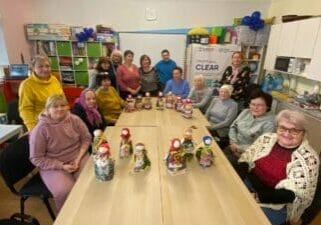News > Blog
Adapting for the Future Defined by Locally-Led Development: A Q&A with Our President Carrie Hessler-Radelet
Published 08/21/2024 by Global Communities
By Paula Rudnicka, Sr. Manager for Public Affairs. Video production by Kallista Zormelo and Michael Kamel.

Localization is one of the most significant movements shaping our industry today. Major donors are beginning to focus their philanthropy on those who are closest to the knowledge, action and impact. The shift towards localization is reshaping the role of international nongovernmental organizations in the development and humanitarian assistance sector. Instead of traditional top-down approaches, international organizations are called upon to decentralize their decision-making, embrace local leadership and advance locally-led solutions.
I recently sat down with our President and CEO Carrie Hessler-Radelet to discuss why investing in locally-led solutions is the most effective approach to foreign assistance. We also talked about how Global Communities is turning its localization commitments into action while remaining engaged and invested in shaping a more just, prosperous and equitable global community.
The conversation was edited for length and clarity.

Paula: Your Strategic Vision 2030 demonstrates a strong commitment to locally led development. Why is localization the most effective approach to development assistance?
 Carrie: I have worked in the development sector for over 40 years, and I have learned an important truth: talent, intellect and motivation are equally distributed around the world, but opportunity is not. International organizations like ours have the responsibility to invest in the power and potential of individuals and communities we work with so that they can thrive.
Carrie: I have worked in the development sector for over 40 years, and I have learned an important truth: talent, intellect and motivation are equally distributed around the world, but opportunity is not. International organizations like ours have the responsibility to invest in the power and potential of individuals and communities we work with so that they can thrive.
Locally-led development is the most effective approach because our communities have the best understanding of what they need. They also know what works and what doesn’t. They often have the solutions but lack the opportunity or the resources to attain the vision they have for themselves. Localization puts those who are closest to the problem and the solution in the driver’s seat. It strengthens citizen engagement and mobilizes local talent, leading to enhanced aid effectiveness and greater sustainability.

Paula: What steps does our sector have to take to embrace locally led development?
 Carrie: First, we need to critically examine the ways in which our current business models and our own actions may unintentionally perpetuate power imbalances between the Global North and our partner communities. This takes serious reflection. Second, we need to adapt our operational environment and decentralize decision-making. Third, we need to empower our own global staff, particularly in our country offices, to lead our organization into the future defined by localization. And fourth, we must invest in our local partners and shape more equitable relationships with them, grounded in the idea of capacity sharing.
Carrie: First, we need to critically examine the ways in which our current business models and our own actions may unintentionally perpetuate power imbalances between the Global North and our partner communities. This takes serious reflection. Second, we need to adapt our operational environment and decentralize decision-making. Third, we need to empower our own global staff, particularly in our country offices, to lead our organization into the future defined by localization. And fourth, we must invest in our local partners and shape more equitable relationships with them, grounded in the idea of capacity sharing.
We all have something to share. We all have something to give. We all have something to learn. Together, we are stronger. This is the core of how we must work together in the future.

Paula: What is your vision for Global Communities’ role in the localization movement?
 Carrie: Our commitment to locally-led development is decades-old, and it is rooted in our cooperative development history. Localization is also ingrained in our mission, which is to connect local ingenuity and global insights to save lives, advance equity and secure strong futures. Our philosophy moving forward is to be as local as possible and as international as necessary. Our role is to support our local partners, bring knowledge from other settings and invest in the power and potential of the communities we work with.
Carrie: Our commitment to locally-led development is decades-old, and it is rooted in our cooperative development history. Localization is also ingrained in our mission, which is to connect local ingenuity and global insights to save lives, advance equity and secure strong futures. Our philosophy moving forward is to be as local as possible and as international as necessary. Our role is to support our local partners, bring knowledge from other settings and invest in the power and potential of the communities we work with.
We have created a localization working group and a localization strategy, which will guide our work in this area. We are at the beginning stages of operationalizing it, but we have already made significant progress. For example, the vast majority of our staff are host country nationals, and we are beginning to decentralize our decision-making so that it is as close to the action, impact and local knowledge as possible. The content of our work in many of our country programs is deeply focused on locally-led development, too.
In addition, we are incredibly proud to have successfully localized several country programs. For example, Project Concern International (PCI) India and Project Concern Zambia (PCZ) are now entirely independent organizations, working with Global Communities as equal partners. They have their own boards of directors and management structures. We work together through service management agreements, and we are committed to each other’s success. But Global Communities is not their parent organization. The localization working group will help us figure out a way to work more effectively with these local entities.
My long-term vision is to create a global partners network, i.e., an ecosystem of country offices and local entities that are committed to the same ideals and to each other. Their missions will be strategically aligned, and they will share capacity with one another.
Ultimately, Global Communities will no longer be an American organization led from the Global North. Rather, we will be a global organization that shares capacity, power and knowledge with the network. This is what really excites me about the future.
This is a long-term effort, which requires a significant mind shift across the organization. We need to keep releasing our own power and privilege. This is what we are doing right now. We are embarking on a journey to build a new culture, which in some ways is the hardest. But it is also at the very heart of the vision we have set for ourselves.


Paula: How can our audience learn more about locally-led development?
 Carrie: Thankfully, we are not alone in this effort. We are a part of a larger group called the Movement for Community-led Development (MCLD). Their hashtag is #ShiftThePower. They are a wonderful partner. I am a Board Member, and we are actively involved in their forums and discussions. We are absolutely committed to advancing their mission, and we gain a great deal of insights from the community they have created.
Carrie: Thankfully, we are not alone in this effort. We are a part of a larger group called the Movement for Community-led Development (MCLD). Their hashtag is #ShiftThePower. They are a wonderful partner. I am a Board Member, and we are actively involved in their forums and discussions. We are absolutely committed to advancing their mission, and we gain a great deal of insights from the community they have created.

Paula: Thank you for your insights, Carrie!
Stay tuned to learn more about how Global Communities is applying localization principles in our sustainable development and humanitarian assistance programs.




